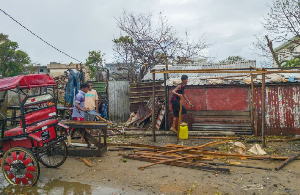The over 51 per cent of Ghana’s population now living in urban centres is a phenomenon that has lots of negative implications for the country, Dr. Delali B. Dovie, Research Fellow at the Regional Institute for Population Studies, University of Ghana, said on Thursday.
He said the increase of Ghana’s urban population which used to be between 40 to 42 per cent about a decade ago to 51 per cent has challenges for infrastructural and development planning.
Speaking to the Ghana News Agency in an interview in Accra, Dr. Dovie said “a country should always have majority of its population based in the rural areas so they could engage in agricultural production to feed the population”.
He said some adaptation habits like harvesting of rain water for flashing of toilet, watering of gardens, etc when adopted by the people could help reduce the amount of rain water that caused flooding in the country.
He said the drains needed to be well engineered to absorb or drain the rain water while the enforcement of building codes should also be carried out.
At a stakeholders seminar to brief participants on the findings on effects of climate change on selected coastal areas in Ghana, Dr. Dovie disclosed that extreme heat, flooding from rainfall and sea level rise, as well as heavy rains were identified as some climatic hazards confronting the coastal areas.
The study carried out within the James Town, Ussher Town and Glefe communities in the Ashiedu Keteke and Ablekuma South districts and Adafoa in the Dangme West district also revealed that climate change impact on those communities had resulted in fish catch reduction leading to loss of income, damage to infrastructure and properties as a result of flooding and other health problems such as respiratory diseases and malaria.
The Regional Institute for Population Studies, under its Climate and Development Knowledge Network (CDKN) is implementing the research project entitled, “A climate Change risk Communication framework for Coastal Urban Development Policy”.
The project is intended to contribute to the strengthening of resilience through climate-related disaster risk management activities including risk communication on all relevant and appropriate stakeholders, especially those in the government sectors actively engaging in policy, civil society and those directly vulnerable to the impacts of climate change.
He said the initiatives further observed that managing climate-related risks in coastal environments especially in urban communities had come into sharp scrutiny in recent times, and often blamed on the lack of a comprehensive planning framework to mange such risks that tend to further aggravate the impact of climate change.
Therefore, a climate change risk communication framework for coastal urban development planning would in no doubt contribute significantly to managing the risks, for which the research was intended to pursue.
The research finding also revealed that some of the residents in those coastal areas were moving out of the original base into other neighbouring communities to engage in their activities.
On the way forward, participants suggested that there was the need to manage the coastal areas very well through intensified education on the need to protect coastal areas to save Ghana’s coasts.
Regional News of Friday, 28 September 2012
Source: GNA













